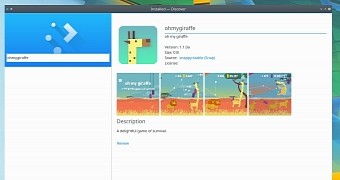KDE developer Aleix Pol is reporting today on the progress of the Snap backend for the Plasma Discover graphical package manager of the KDE Plasma desktop environment.
As some of you out there are aware already, the latest KDE Plasma 5.10 desktop environment shipped with preview versions of the Snap and Flatpak backends to allow users to install applications that are distributed in the Snap and Flatpak universal package format.
But with every new major release of the KDE Plasma 5 desktop environment, these components are always improved, and it now looks like the Snap backend will be stable enough to be used in production environment this fall when the KDE Plasma 5.11 desktop environment launches on October 10, 2017.
"Long due, some of you have already been using the testing version of it. During this sprint it was refactored to use the snapd-glib library that should simplify a bit the maintainership of this piece of software. I’m aiming to having a stable snap back-end for Plasma 5.11," says Aleix Pol in his latest blog post.
Snaps will look just like native KDE apps
Snap is one of the many universal binary formats for distributing Linux apps across multiple operating systems. It was developed by Canonical for Ubuntu Linux, and it integrates very well with IoT (Internet of Things) and Cloud stuff, but on the desktop, it still needs a little bit of tweaking to work as it should.
According to Aleix Pol, for Snap packages to look and feel just like the rest of the native apps you might have installed on your KDE Plasma 5 desktop, some work needs to be done for things like icons, fonts, and styling, but it's getting there and the developer promises that you won't notice any difference.
As for the KDE Plasma 5.11 desktop environment, a Beta version will be available on September 14, and the final release launched October 10, 2017. You'll have to upgrade to KDE Plasma 5.11 to enjoy the stable Snap support if you care about installing Snap packages from Canonical's Snappy Store or a third-party one.

 14 DAY TRIAL //
14 DAY TRIAL //